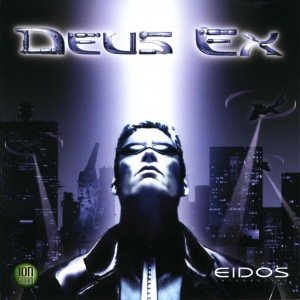450th played so far
Genre: First-Person Shooter/Role-Playing
Platform: PC
Year of Release: 2000
Developer: Ion Storm
Publisher: Eidos Interactive
Here we go! 450 games, the last minor landmark before our big one.
Deus Ex has been on the list of games I’ve wanted to play for a while. We’ve come across FPS games with RPG elements a few times now, to a greater or lesser extent, and in a way Deus Ex was the first game to really (notably) do so. Aside from me always having enjoyed the game for this (even if I didn’t necessarily get deep into it, having watched it just as much), it’s felt like a benchmark I’ve wanted to refer back to.
Plus, not having played it for a while, seeing how the game’s RPG elements to other games seemed valuable too. How much does Borderlands‘ systems tie into the RPG system? How does Bioshock‘s system of choices apply? And how much of a link is there really between this and Mass Effect, who share the same genre? It’s about time we played this.
Our Thoughts
Where to begin? The game still holds up in most ways. Graphically, the game looks dated (although I believe there are mods to fix that), but they are functional enough. The colours can be a bit samey and hide parts of the world from time to time, meaning you have to pay some attention to what’s going on sometimes. Even so, it’s pretty clear most of the time. The character models have similar issues, but they are pretty distinctive, which is enough to create the personality needed in the game.
The game has several characters that pay this off, characters that feel distinct from the start, with even the grunts you encounter having some personality. Although a number of them respond only with one liners, there are several longer conversations to be had, often interactive, making the game feel more RPG-like, as well as giving your character some direction.
The game’s structure shows this even more. The game feels incredibly reactive – more so than even seems common within RPGs. On the first mission, you can rescue one of your future partners. It’s an optional mission goal – getting the bad guy is more important. If you don’t free him, however, he will keep bringing it up – not only will your pay be docked (in a real conversation, not just an end of mission screen) but people reference it. In later levels, recurring characters you kill stay dead and your choices continue to matter. There are several sidequests, not required but useful to play through.
Completing the RPG elements are skills, leveled as you gain experience in a way similar to No One Lives Forever 2, as well as having slots that force you to choose between upgrades. There’s an inventory system. It’s not the most in depth system, but as you get into it it’s clear this is a true RPG, not a game with some elements like, say, Bioshock. The game also offers several different approaches to most missions – stealth and combat usually being two major options, but also often having some hacking making your missions easier – disabling a big bot in the first mission helps a lot.
Still, the game remains an FPS as well, and that shows in places. For a large part of the game, shooting is a definite option to make it through the missions, and your own skill is still a driving force when it comes to accuracy and such. To me, the FPS options add to it in this game. Your inventory has enough of an impact that the mixing of guns and ammo and other modifications add a lot of strategy.
Final Thoughts
Deus Ex holds up. It may not always look the best, but the mix of RPG and FPS works really well – there’s a good reason it set such a high standard for sequels. As good as its production standards are, Mass Effect‘s world doesn’t feel half as reactive in total as Deus Ex feels in its first few missions.
It’s a game where being ambitious paid off, even if few games after it got quite as far. A good pinnacle – engaging and fun.
